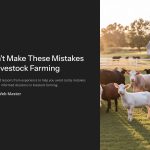 Livestock farming is a complex industry that requires knowledge, patience, and hands-on experience. Many beginners dive into it without understanding the challenges, leading to financial loss and operational failure. This post shares real-world experiences and practical lessons learned from the field to help you avoid costly mistakes. Whether you’re a new farmer or an experienced one looking to improve your operations, these insights will guide you in making informed decisions.
Livestock farming is a complex industry that requires knowledge, patience, and hands-on experience. Many beginners dive into it without understanding the challenges, leading to financial loss and operational failure. This post shares real-world experiences and practical lessons learned from the field to help you avoid costly mistakes. Whether you’re a new farmer or an experienced one looking to improve your operations, these insights will guide you in making informed decisions.

The Importance of Proper Animal Selection
One of the biggest mistakes livestock farmers make is choosing animals based on price rather than quality. Cheap livestock often comes with health issues, genetic problems, and poor productivity. Selecting the right breed suited for your climate and farming goals is crucial.
When choosing livestock, consider factors like:
- Genetic background – Some breeds are more disease-resistant and productive.
- Health status – Always check for vaccination records and overall health.
- Feeding requirements – Some animals require specialized diets, increasing operational costs.
- Growth rate and reproduction – Faster-growing breeds with high fertility rates are more profitable.
Working with reputable breeders and conducting thorough research before purchasing will save you from long-term losses.

Feeding Mistakes That Reduce Productivity
Nutrition plays a vital role in livestock farming. Many farmers fail to provide a balanced diet, leading to slow growth, low reproduction rates, and high mortality. Common feeding mistakes include:
- Over-reliance on low-cost feeds – Cheap feed often lacks essential nutrients.
- Improper rationing – Overfeeding or underfeeding can negatively impact growth.
- Ignoring feed quality – Moldy or contaminated feed leads to disease outbreaks.
- Failure to adjust diets based on growth stages – Young, pregnant, and lactating animals have different nutritional needs.
A proper feeding program should be developed based on expert recommendations and scientific research.

Disease Management and Preventative Care
Health management is a significant challenge in livestock farming. Poor disease control can lead to outbreaks that wipe out entire herds. The most common mistakes include:
- Skipping vaccinations – Many diseases are preventable with proper vaccination.
- Ignoring early symptoms – Delayed treatment leads to more severe health issues.
- Lack of biosecurity measures – Visitors, new animals, and contaminated feed can introduce diseases.
- Improper quarantine practices – Newly acquired animals should always be quarantined before mixing with the herd.
Investing in veterinary consultations and maintaining a strict disease prevention program is essential for long-term success.

Waste Management and Environmental Impact
Improper waste management can lead to environmental damage and regulatory fines. Many farmers fail to implement sustainable practices, which affects both productivity and community relations. Key areas to focus on include:
- Manure management – Using manure as fertilizer instead of dumping it improperly.
- Wastewater treatment – Preventing contamination of nearby water sources.
- Odor control – Using composting methods and proper barn ventilation.
- Sustainable practices – Implementing rotational grazing and minimizing waste production.
Complying with environmental regulations and using eco-friendly practices benefits both the farm and the surrounding ecosystem.

Financial Planning and Cost Control
Many farmers underestimate the costs involved in livestock farming, leading to financial strain. Budgeting mistakes to avoid include:
- Underestimating operational costs – Feed, medical care, and infrastructure costs add up.
- Lack of emergency funds – Unforeseen issues like disease outbreaks require financial preparedness.
- Poor record-keeping – Not tracking expenses can result in budget overruns.
- Overexpansion without planning – Growing too fast can strain resources.
A well-structured financial plan ensures the farm remains profitable and sustainable.

Marketing and Selling Livestock Profitably
Selling livestock profitably is just as important as raising them. Many farmers make the mistake of selling their animals at low prices due to lack of market knowledge. Strategies to maximize profit include:
- Understanding market demand – Knowing when prices peak helps maximize revenue.
- Diversifying revenue streams – Selling meat, milk, wool, or manure increases profitability.
- Building relationships with buyers – Consistent quality attracts repeat customers.
- Utilizing online platforms – Digital marketing can expand sales beyond local markets.
Proper marketing strategies ensure steady income and long-term business success.
*Capturing unauthorized images is prohibited*




